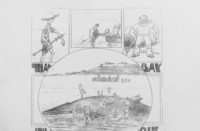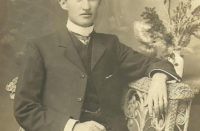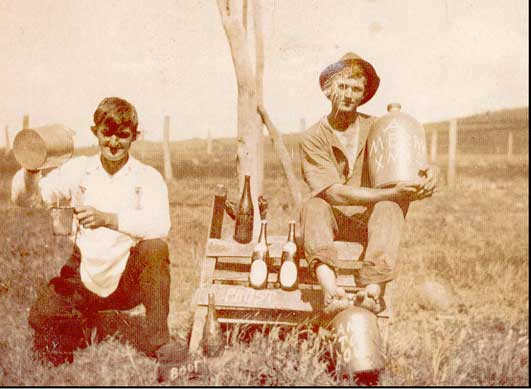‘I tink I’ll haf Annuder Vone!’ – The love of Wine
Mac Scharfstein
Max Scharfstein comed from Deutcherland
Vence comes der larger beer
Had Scharfstein stoped in Deutcherland
Den he never vos been here!
Old Max could not be here und dere
Ve all must own vhats true
As true as birds fly in the air
Or twice times four makes two.
Now Max he one leetle flask
Vhat held a pint or so
And everywhere where Scharfstein vent
That flask vas sure to go.
He worked at every sort of job
Fory effery knid of men
Some veekes he earned him thirty bob
Some veekes one pound ten.
His nose got red his waist grew big
His coat too tight to wear
So long old Max he got his swig
Max Scharfstein didn’t care.
Vone day his flask vas drained quite dry
But Max spied out a tent
No dead or living soul was nigh
So trugh dat tent he vent!
He saw some likker in a flask
He sized it den und dere
Vot kind it vas he didn’t ask
Max Scharfstein didn’t care.
He did not stop to reason why
To scratch his head or tink
But tipped it oop und drained it dry
As quick as you could trink!
Den Max gots white unbd blue und green
Und tried in vain to schwear
For trinking nitro-gliscerine
Max Scharfstein didn’t care!
Max schreamed mit pain und from dat tent
Like some fat porpoise sphrang
Den up he tipped und down he vent
With one almight bang!
Dhere vas one big ear-sphlitting sounded
Den vhere vas Max off where,
Dhere vas some leetle pieces round
But Max Scharfstein didn’t care!
Peter Vonhoff, Plainby, with his small barrel of ‘zoog’ (zeug) in preparation for another wonderful musical session
From the Darling Downs Gazette of January the 12th 1895 comes the following ‘ditty” between father (vatter or votter) and son:
Herr Grout: ‘Ach, mein son, dot vos very goot beer. Now I go me again to schlep, and whenever I vas dhirsty you vakes me.’
Hans: ‘All right, fadder: but vhen vill you pe dhirsty?’
Herr Grout: ‘Vhenever you vakes me!’
An incident from the Darling Downs Gazette from April 1873 gives some indication of the primitive conditions of the roadways in the township of Toowoomba in earlier times and an insight into the nocturnal customs of the early inhabitants.
“On Sunday evening last the residents of Ruthven Street west were alarmed by cries of distress proceeding from that part of the swamp which is situated at the western extremity of Herries Street. On proceeding to the spot it was discovered that an inebriate German named Englehardt had mistaken Herries for James Street, and failing to find a crossing, had conducted his horse almost to the centre of the swamp. His lines had evidently not fallen to him in pleasant places, inasmuch as the horse appeared to have stuck fast in about four feet of mud, while no available opportunity of escape was presented to its rider, hence the alarm and the cry of distress.
A plan of release was suggested by Senior Constable Ludgate and finally adopted, namely, that Mr Englehardt should vacate the saddle and make the best way he could to the shore. This he accomplished with the loss of his boots and at considerable personal inconvenience, arising in great measure from the adhesive properties of the mud. On reaching terra firma he presented the appearance of a “mud lark”, and it was considered advisable under the circumstances to give him a night’s lodging in Government buildings. In answer to a question from police relating to the cause of the accident, Mr Englehardt replied “Mine horse got drunk, and then he went to get sober”. The police declined to accept the information and the result was that the unfortunate explorer was consigned to durance vile. The horse was extricated with great difficulty, and taken to the Police Station where it was delivered to Mr Englehardt after his release from the custody of the lockup keeper on Monday morning”.
(reproduced with permission of local historian, Bob Dansie).
Other ‘drunken incidents’ with horses were fairly commonplace. Mr H V Sinnamon of Seventeen Mile Rocks recalled: “I remember an old German settler at the Rocks who drove his horse and springcart from here to Brisbane every Saturday for shopping. Whilst there he would imbibe and every Saturday afternoon he would return sitting up asleep upon the cart seat – nodding in sound slumber with the reigns dangling around his feet while the horse went jogging on. That horse would bring him and the cart safely home from distant Brisbane to his own place, at a leisurely pace, safely through all the traffic.”
At the Prince of Wales Hotel, located in James Street (Toowoomba) the ‘Chronicle’ of 30th December 1868 reported on the death of a Herr Grau, German interpreter and Professor of Music, who was found dead in Mr Flori’s Public House. The cause of death was not investigated but some claimed it was due to excess consumption of alcohol.
Petermann’s Imperial Hotel, Toowoomba. Unfortunately the building was demolished in the 1960s when heritage buidings were not in favour.
Old wine press and barrel from the old Vonhoff family farm. Groomsville
Of course it is a well known fact that in the Lockyer and Middle Ridge areas nearly every German residence and certainly most farms had its own vineyard – at the very least the grapes were grown for home production and consumption of wine – of varying quality and potency. In addition many farmers had extensive fruit orchards, growing citrus, peaches, plums and apricots. Some of this produce was often distilled into a potent drink. For instance Gus Heuschele of Middle Ridge was known to distill apricot ‘brandy’ – of amazing potency. Many settlers made orange wine or brandy.
Adam Erbacher, well-known identity of Middle Ridge and early Toowoomba used to say, ‘Mein grapes vere so big und goot dat you vould need your mouth whole wide open to swallow just vone!’ Certainly nearly every German farm in southern Queensland had its vines, often for home consumption. Quality varied enormously, but in many cases there were ‘often at least two fights to the bottle’.
Down in the Lockyer Valley wine growing, and drinking, was a common pastime. Rudy Manz, retired farmer now living in Laidley, often speaks of ‘old’ Fred Harpeng who often said, “Mein bruder Emil und me, ve’d go und yet yallons und yallons of vine und den ve trink und haf some mighty gut fights!”
Fred Harpeng, bandoneon player from the Lockyer Valley and always ready for a few trinks!
A complaint in the local newspaper expressed what could be termed early racial tension in the late 1860s:
‘Dear Sir,
Through your columns I beg to call the attention of police authorities to the demoralizing conduct of a lot of Germans in James Street during last evening and the greater part of the night. Opposite the residence of Mr White, near Stein’s bridge, is a dilapidated dwelling house which changes tenants as often as the wind shifts. During the recent tenancy of a Mr Matthews the place was decent and orderly. Within the last week or so, a German couple have taken the place and yesterday being a fine day, a regular house-warming took place. The guests began to assemble about 4 o’clock in the afternoon, and dancing commenced to the music of a vile fiddle. The amusements were varied, with some lively songs in stentorian voices and an occasional yell of delight. The performers being evidently much better pleased with the fun than the neighbours or passers by. The noise and disorderly conduct increased as the night advanced and as I passed home from Divine Service the stamping of feet and discordant yelling put one in mind of “Hell let loose”, and this too on a Sunday in the midst of the town of Toowoomba.
I believe the police very seldom visit this end of town, except occasionally to evince their zeal in the public service by destroying some poor offending goat, but it is to be hoped that this exposure will have the effect of drawing some of them to this locality next Sunday to put a stop to a scene which is a serious outrage upon society and a disgrace to any civilized society.
Yours Obediently,
A resident of the Main Range
Toowoomba, April 12 1869’
An advertisement in Toowoomba’s Darling Downs Gazette of 12th October 1875 stated:
‘Arnold’s new drag starts from Bowen Hotel and the Post Office for Hartmann’s and Roessler’s Gardens at half past two o’ clock. Returning about 6pm. Fares 2s 6p.
(Arnold Brothers)
(I have been reliably informed that these ‘sightseeing tours’ were often an excuse for binge drinking – and the taxi carriage trip home was often very lively! Much like todays ‘boose bus’ for hotel patrons.) (Ernie Hills, Toowoomba)
Not all patrons paid for their vineyard excursions. For instance the Darling Downs Gazette issue of the 18th of February 1865 describes evidence that 2 bunches of grapes were stolen from John Holl by Ernest Brenkman – who was later sentenced to 3 months hard labour in the Toowoomba Gaol for such a ‘crime’!
One day, Gottlieb Pinnow drove his old horse and sulky to the station to get some empty cream cans. His harness was in a sorry state, being held together in some places by string. Hermann Zornig, Mr Doeblien, Fritz Haach and Gottlieb Pinnow then decided to ride in the sulky to the Yatala pub for a few drinks. Three climbed in safely, but when the fourth got in, the shafts broke and the sulky tipped back, dumping the men on the ground. After surveying the damage, old Gottlieb said, “Now Hermann, you vill to mend mein harness; Fritz Haach you vill mein sulky mend; und Fritz Doebien, you vill wein give me!” After this was agreed to, the friends all walked to the Yatala pub!
Like many members of the Zornig clan, Hermann Zornig and his wife Kate were Queensland Railway workers. Hermann joined the railways in 1905 and soon after they were transferred to Stapylton, near Beenleigh in the Logan district, where Kate was the Station Mistress for over thirty years and Hermann was first a fettler, later a ganger, in the flying gang. He held that position till his retirement. Hermann was ‘very fond’ of a few drinks In those early days, the ballast train was known as “Ballyhooley”, goods trains were called “Old Kate”, and fettlers received their pay by train, which would stop wherever the gang would be working on pay day. On one particular pay day, Hermann Zornig’s gang was working on the line near his wife’s Station House at Stapylton. Pay in pocket, Hermann decided to go to Beenleigh for a few beers, so he got on a railway ‘trike’ and flew by Stapylton to Beenleigh in quest of cold lager. Next pay day, Hermann thought he’d repeat the exercise, only to find that his beloved had put a wooden sleeper on the line which derailed his trike. Undaunted, Hermann made sure he was working on the Beenleigh side of Staplyton Station next pay day, and he then had a much smoother journey to the pub!
Up in the Ravensbourne district, old Jacob Weller grew a lot of grapes and made his own wine in a big trough. He was seen one day, going about his business of making wine, standing on the dirt, then stepped into the trough marching up and down the huge trough with pipe in his mouth, the ash from his pipe falling into the wine. Jacob had no floor in his house at this time, just the dirt floor. He would walk into the house for something and walk straight back into the grapes!
Also in the Ravensbourne district, northeast of Toowoomba, German farmers grew crops, dairied, and of course also made their wine. One surviving story, told by Ravensbourne descendant Colin Beutel in his book ‘Ravensbourne Then & Now’, concerns wine-making in the area. One elderly German resident farmer was well known for many years for his wine making ability. However, one night, instead of mixing sugar with the wine, he mistakenly added salt, and at that time the farmer employed a local lad who had friends nearby. One dark night, they decided to help themselves to a red wine treat. So, the two friends of the employed lad, filled their two-gallon bucket with the salted wine, of which they drank freely on their journey homewards. They were very drunk and very sick for three days. It was said that every time they drank water for thirst, they were drunk again and the sting was ‘in the tail’ for three days. The farmer said that the boys had been taking my wine and that this time they took the wrong lot!
Down in the fertile Lockyer Valley, which is the agricultural belt separating coastal Brisbane from Toowoomba, the large German-derived Apostolic Church of Queensland community loved their wurst and wine. Ron Kerle (from Minden) told me the following story:
‘Apostolic wine was held in high favour – if you wanted to buy it you drove through their gate [at the Hattonvale Cathedral] after church on Sunday. All the sulkies would line up and pay two bob for the privilege of going through the gate. They paid just to go through the gate, not for the wine, so it wasn’t illegal. Further on a very taciturn man would shove a bottle of wine into the sulky saying, “Move on”. After the War when the vines were ripped out this wonderful custom ceased.’
‘I tink I’ll haff anudder vone!’
August Wilhelm Zillmann, born 1887 at Hatton Vale was a well known and much loved ‘character’ in the Lockyer district. Born with several deformities and only a small man who was crippled, he is reputed to have excelled at bookwork and had a quick mind and quick temper! Les Moreland told me ‘Uncle Augie’ was very keen on having a few drinks at the old Plainland Pub – he was so short that the barman could only see his big claw-like fingers emerging above the bar as he called ‘I tink I’ll haf annuder vone!’ The barman would relent until after too many drinks his client would become argumentative. In this case other patrons, and the barman would haul Augie out the door and ‘hang him on the barbed wire fence, just like a scarecrow – till he soon sobered up and took himself homewards! Many old folk remember little Augie as ‘a great drinker’.
Another of the well-loved characters resided in the Helidon district (Upper Lockyer, below the Toowoomba Range) was known as ‘Vater Gierke’. Vater Gierke was very fond of fishing and as he was hauling in a catch he would often say, ‘Come in outa da wet boy ’. Another of his sayings was: ‘Vhen I’m fishin’, I’m fishin’, vhen I’m drinkin’, I’m drinkin’. (related in ‘A Life Worth Living – Memories of Martha Topp Scanlan’ written by her children and grandchildren).
Photo shows ‘Vater’ Gierke on right with squeezebox with Bill Staatz on left with accordian and his dad ‘old man’ Staatz in centre (with fiddle).
Harry (Hermann) Labudda of Durong and his mates Darby O’Shannessy and Bill Trusz once went to Dalby and got on a spree for a few days. The day they decided to come home was a beautiful sunny day, and as they went northwards across the Jimbour plain the heat mirage was at its very best. Harry stopped his car and said, ‘Im not going to put my car through dat water, ve’ll back go to Dalby and haf annuder try tomorrows’.
Michael Kirstenfeldt who resided in the Evergreen area remained a bachelor all his life. He lived in a hut on the Cooyar Range for much of his life. Fond of a drink, he was a drinking mate of Anna “Granny” Benecke. There is a story of them going home after a session in a cart. They ran the wheel up a bank and were tipped out into the prickly pear. No doubt a very sobering experience!
Dr Seidel’s Medicine!
Medical practitioner Dr Ernest Seidel was a pioneer vintner in the St George region. In 1862 Dr Ernest Frederick Seidel was the first to grow wine grapes at St George, one year before Samuel Bassett established vines at Roma. Seidels’ cuttings came by packhorse from James Busby’s cutting banks in the Hunter Valley. Unfortunately, from 500 cuttings, only 3 struck. Next year he planted 1,000 cuttings from which 25 struck. He planted another 1,000 in the third year and got 35 to grow. Nonetheless, he persevered until 2 acres were established. By 1876 about 1,400 gallons were ready for bottling. In addition to grapes, Dr Seidel grew fruit trees of every known variety with tropical fruits, shrubs and flowers bearing abundantly. His vineyard was located where the St George sportsground was later developed. Hopefully his medical practice was more fruitful than his vineyard enterprise! Two smaller vineyards also produced good quality wine grapes. Both were established by other Germans, Harry Keuchler and Herr Ludiaman. In 1992, some 130 years after Dr Seidel began planting vines, the first wine grapes of the modern era were planted at Riversands Vineyards.
Booze Day!
In the late 1890s many Lutheran congregations still observed mid-week, the so-called days of repentance (in the German language called Busstag, the first syllable rhyming with ‘goose’). In one Queensland country town, when the pastor in his Sunday announcements made much of the day of repentance on the following Wednesday, two farmers who both lived closed to town decided they would walk together to that mid-week service.
Dressed in their ‘Sunday best’, they set out for the Church with the very best of intentions. But the day was warm and they were not comfortable in the good clothes they were wearing. As they passed the local hotel, said the one: ‘Let’s go in and have a quick one. I feel so thirsty.’ ‘A splendid idea!’ said the other. The publican looked them up and down and said: ‘Where are you going, all dressed up?.’ ‘To church’, they replied, ‘it’s Boose day today.’ He didn’t quite know what they meant, but he didn’t mind being included in the proceedings.
The above photo, taken by keen amateur photographer Pastor Armin Bode when visiting the Greenwood congregation, literally illustrating ‘Booze Day’. Some of the participants seem to be in the spirit of the toast!





Re the Harry Labudda story, my older sister says he was a cousin of our old neighbour and family friend at Home Creek (Kingaroy district), Mrs Stumer. He often called on her when en route back to Durong. She told the story that oney day he arrived well and truly under the influence after a trip to town. In her usual manner she gave him a bit of advice, “Now you drive straight,” to which he replied “How can I missus when the road is crooked?”